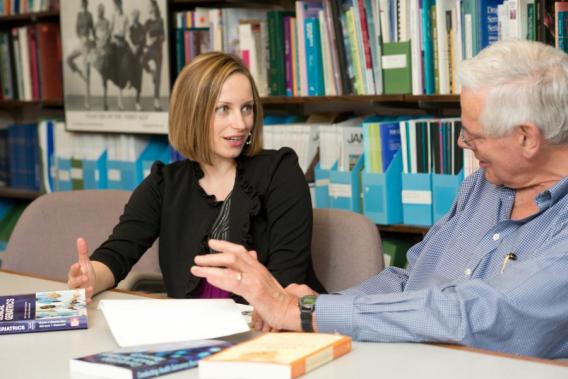When Tetyana Shippee, PhD, joined the University of Minnesota as an Assistant Professor, she was eager to advance research to help nursing home residents, but knew she’d need hands-on experience, tailored training, and dedicated support to be successful.
She applied and was accepted into the Clinical and Translational Science Institute’s (CTSI’s) KL2 Scholars Career Development Program, which she saw as an “incredible opportunity” to accelerate her research career.
CTSI’s support ultimately helped Dr. Shippee land a $1.77 million R01 grant to further her research.
“The protected time, training, mentorship, and support I received through CTSI’s KL2 Scholars Career Development Program has had a significant impact on my research career,” says Dr. Shippee of the School of Public Health. “CTSI’s support enabled me to secure an R01 grant to continue my research, which ultimately aims to improve quality of life for nursing home residents.”
Immersing herself in her research
Dr. Shippee realized the importance of her research topic first-hand when she lived in a continuing care facility for seniors as a PhD student:
“For older adults who live in a nursing home, that facility is their world. Most residents will not go home anytime soon, so it is vital for them to lead a pleasant, comfortable life with meaning, dignity, and the seemingly little things that contribute to their personal happiness.”
Dr. Shippee spent two years living in the retirement community to better understand residents’ quality of life, which has been the underlying theme of her research for more than 10 years.
Taking the first steps as a faculty researcher
Dr. Shippee wanted to build on these first-hand insights -- in addition to her expertise in gerontology and sociology -- and began seeking an in-depth training experience that could help her become a successful, independently funded researcher.
CTSI’s KL2 Scholars Career Development Program did exactly that, protecting 75 percent of Dr. Shippee’s time exclusively for research endeavors, an interdisciplinary team of top senior mentors, and comprehensive career development support, from in-depth progress reviews to training on essential research skills.
In addition, the National Institutes of Health (NIH)-funded institutional training grant provides the University’s KL2 scholars with $100,000 in salary support and $26,000 in research funds per year, for three years, and ongoing career development support as a CTSI alum.
The KL2 program is part of CTSI’s broader Research Education, Training, and Career Development function (CTSI-Ed), which has a number of programs to advance the research careers of faculty, staff, and students.
“Even for someone with the impeccable training and resume that Tetyana Shippee brought to our school, building a successful research career requires funding, time, and support,” says School of Public Health Dean John Finnegan, PhD. “Partnering with CTSI is one way to help give our rising stars the momentum they need to take their careers to the next level.”

Developing skills and key relationships
Dr. Shippee used the protected time and support to pursue her research and grow her knowledge in policy and applied work, the direction she wanted to take her career.
She built trusting relationships with individuals at Minnesota’s Department of Human Services (DHS) who would eventually become co-investigators and an essential factor in her ability to secure a major grant.
“Because I had protected time for research, I could jump in on the Department of Human Services’ existing projects, team up with them for my own KL2 research project, and receive access to one of the richest datasets related to the area I’m studying,” says Dr. Shippee, referring to data from the approximately 15,000 interviews with residents from nearly all Minnesota nursing homes that gauge resident quality of life. “My DHS partners also helped me think about how to make my research project actionable, and draw important connections about what matters most to the elderly residents we’re trying to help.”
Adding a diverse range of voices
Through the KL2 program, Dr. Shippee also received mentorship, guidance, and support from individuals across the University.
Her KL2 mentoring team included Robert Kane, MD, from the School of Public Health and Joseph Gaugler, PhD, from the School of Nursing, as well as biostatistical mentor William Thomas, PhD.
She also received informal support and insights from fellow CTSI scholars, as well as a multidisciplinary committee of translational science experts who met with her annually to offer guidance and review her progress, and regular interaction with the KL2 program leadership.
“Becoming a CTSI scholar opened the door to an entire translational research community that I otherwise would not have had access to,” says Dr. Shippee. “Having so many different voices along my research trajectory was tremendously valuable, and is one of the KL2 program’s greatest assets.”

Building her credibility as an investigator
Over the course of her three years as a KL2 scholar, Dr. Shippee conducted a research project that helped grow her body of literature, and build her expertise and credibility as a researcher.
Her work has been published approximately 40 times in her 10 years as a junior investigator, a tally that excludes chapters and other written pieces.
Many publications stem from her KL2 research project, which examined a broad array of factors to determine what influences nursing home quality of life.
Findings identified staffing as a key predictor, and showed facilities that invest in activity staff and nurse hours had higher quality of life scores.

Securing an R01
Two short years after completing CTSI’s KL2 program, Dr. Shippee obtained independent funding to support her research.
The $1.77 million R01 grant from the NIH’s National Institute on Minority Health and Health Disparities builds on Dr. Shippee’s KL2 project and the skills she learned as a scholar, such as grant-writing, time management, and research methodologies.
“Thanks to CTSI and its commitment to advancing researchers’ careers, I could develop the expertise and connections I needed to be scored so highly on an R01 application as a junior investigator,” adds Dr. Shippee.
Dr. Shippee’s grant is an extension of her KL2 work in many ways: she’ll build on the research she conducted as a KL2 scholar, working closely with many of the same mentors and collaborators.
Only this time, her connections at the Department of Human Services -- Robert Held, Valerie Cooke, and Antonia Wilcoxon -- will serve as co-investigators who’ll contribute their expertise, including on nursing home policy and engaging nursing home communities.
Dr. Shippee’s preliminary research revealed racial disparities in nursing home residents’ quality of life, with minorities experiencing lower levels of wellbeing. With the R01 grant, she will get to the bottom of why this is happening and find actionable solutions.
The NIH-supported research lies at the intersection of Dr. Shippee’s two broad areas of interest – long-term care and racial disparities – that, until recently, have been fairly distinct issues.
Addressing racial disparities
Traditionally, there’s been very little research on racial disparities among people living in institutionalized long-term care facilities because there simply weren’t as many minorities living there. Individuals of African-American, Hispanic, Asian, and other minority racial/ethnic and cultural groups had generally preferred to keep elderly relatives out of such care facilities, relying instead on their family network.
This was the case up until the early 2000s – as Dr. Shippee herself was moving into such a facility – when the racial makeup of long-term care facilities started to shift completely.
Now the proportion of minority residents is growing exponentially, with minorities on track to be over-represented compared to their white counterparts by 2030.
Making a difference with research

For Dr. Shippee’s R01 research project, she will interview staff, residents, and community members of six Minnesota nursing homes as well as analyze state and national data about resident quality of life. She aims to identify whether disparities exist and the reasons for the disparities, and ultimately enhance the wellbeing of nursing home residents.
“To me, it’s not enough to identify whether disparities exist,” says Dr. Shippee. “I want the research I’m doing to point to effective ways to take action and make a difference.”
She adds that some issues could be relatively simple to address. For example, recommendations could include offering different food choices, or training nursing home staff on how to work with minorities or individuals who don’t speak English as a native language.
Dr. Shippee is optimistic about the study’s potential:
“Ultimately, I hope to change the way we think about long-term care. My dream is for nursing home residents to have the highest quality of life possible, regardless of their race, culture, or ethnicity.”
